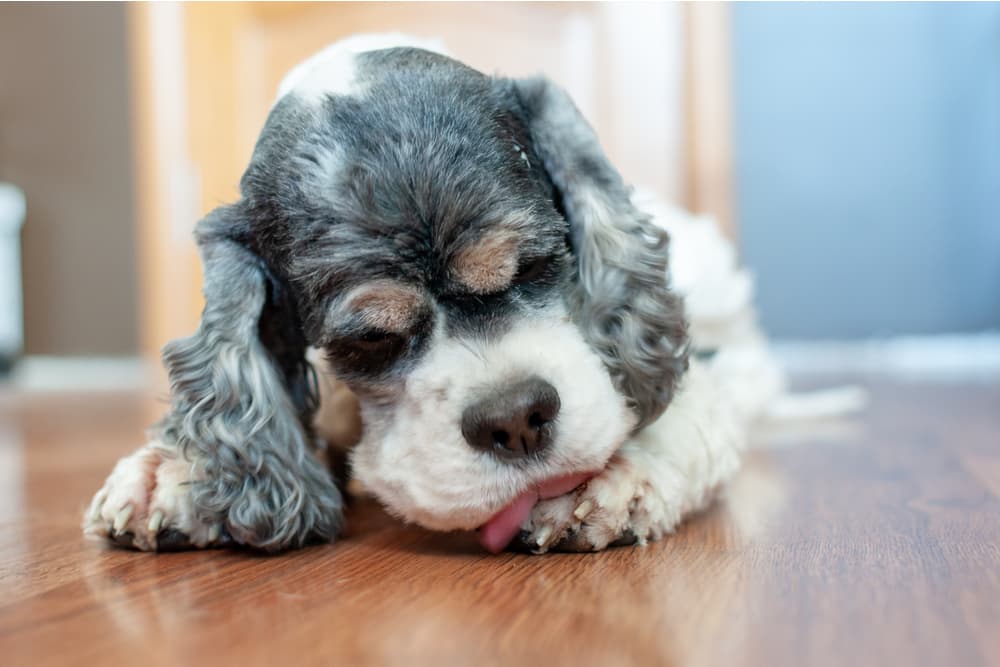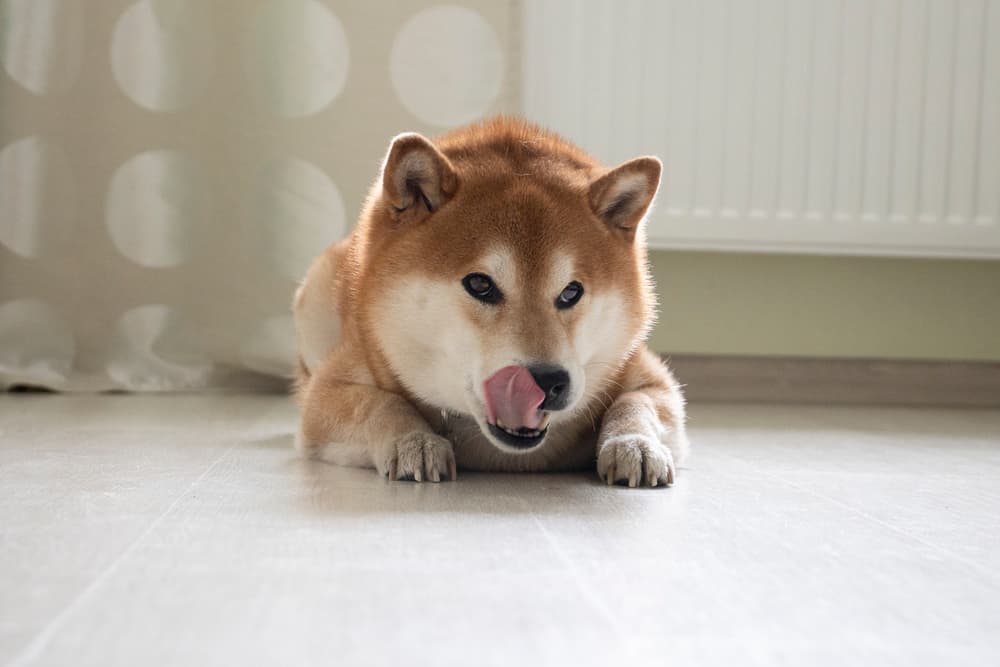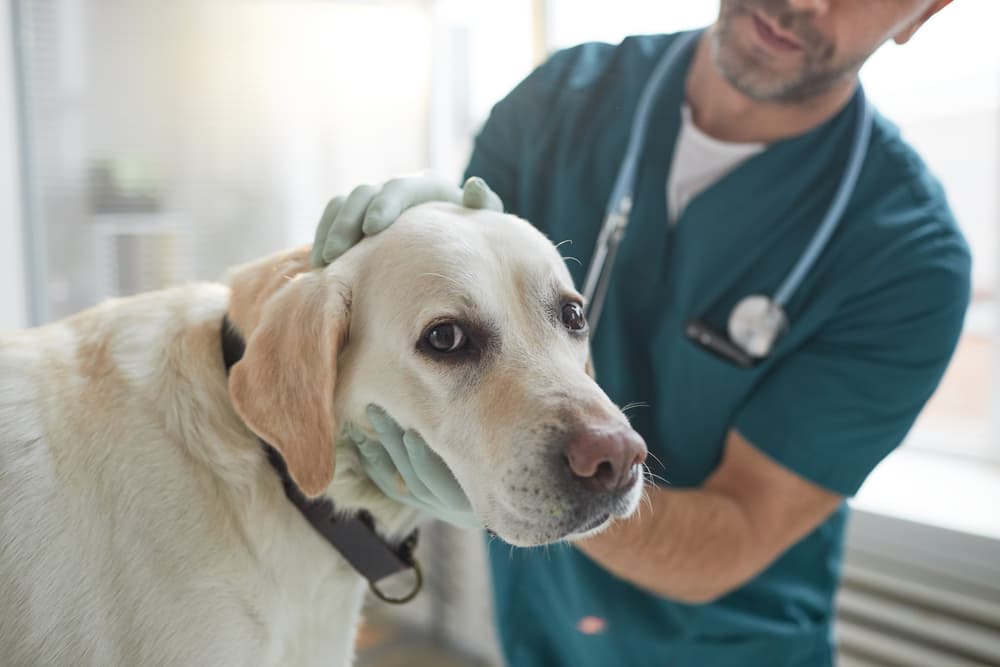Why Is My Dog Licking the Floor?

Your dog has a few favorite pastimes: licking his food bowl, licking himself and licking the floor. He’s been known to lick the linoleum, taste the tile, and wipe down the wood with the fervent flick of his tongue.
There’s an obvious “ick” factor that comes from walking through the puddle of drool your dog left on the floor. But it’s also just, well, weird—or is it?
“Licking the floor can be totally normal,” says Dr. Sara L. Bennett, clinical assistant professor of veterinary behavior at North Carolina State University College of Veterinary Medicine.
Dog Licking: What’s Normal?

Dogs normally use their tongues for eating, drinking, grooming, or offering up wet kisses. These are all normal behaviors, according to Bennett. However, habitual licking might be the sign of an issue.
“In the right context, licking is considered a normal behavior,” she adds.
To determine whether your dog’s licking is normal, Bennett looks at where it happens. In areas where there might be food scraps—think near their food bowls after supper or around the kitchen island—dogs might lick the floor to see if something tasty has fallen.

Frequency, intensity, and duration matter, too. Bennett notes that dogs who lick the floor nonstop without a specific reason may have something more serious going on. In these cases, your vet may diagnose it as excessive licking of surfaces (or ELS).
“When it becomes more habitual—it’s happening multiple times a day in areas where there’s no food present…it lasts more than a couple of minutes and the behavior can’t be interrupted [by calling the dog or offering a treat], it starts to fall into the ‘abnormal’ category and we have to do some detective work to figure out why.”
Why Is My Dog Licking the Floor?

Some of the most common reasons for your dog licking the floor include:
- Food
- Upset stomach
- Stress
- Cushing’s Disease
Food

One of the biggest reasons your dog licks the floor? It may taste good! A few drops of spilled coffee, bacon grease, or spaghetti sauce can send your dog into a floor-licking frenzy.
“If you spill some food on the floor, of course your dog is going to be motivated to lick it up,” Bennett says.
When your dog frantically licks a food-prone area of the floor, Bennett says it’s likely just an attempt to ingest every last crumb.
As long as there aren’t scraps of foods that are toxic to dogs on the floor, it’s ok to let your dog serve as a four-legged vacuum.
Upset Stomach

Tummy troubles are among the most common reasons your dog’s licker may be working overtime. In fact, 73% of dogs with ELS are diagnosed with gastrointestinal issues like irritable bowel syndrome, pancreatitis, and Giardia, according to one study.
“The hypothesis is that it’s a behavioral reaction to feeling sick to their stomachs,” Bennett explains.
Licking the floor increases saliva production, buffering against acid in the stomach. Or, the saliva provides added lubrication to make it easier to vomit, Bennet adds.
When tummy upset is to blame, your dog may be licking the floor and vomiting, eating grass, or panting. Your vet can run tests to determine the source of the tummy upset. Treating the problem should help control the behavior (and feel better).
Stress

Like all repetitive behaviors, a dog licking the floor could be a sign of an obsessive disorder or stress.
“Repetitive floor licking can be a ‘displacement behavior’ and might be a signal that your dog is experiencing anxiety,” explains Dana Emerson, a veterinary technician and Karen Pryor Academy-certified trainer with the University of Minnesota Veterinary Medical Center.
Emerson suggests looking at recent changes to the environment, like a move or new pet. These changes may make your dog feel anxious and cause the behavior. Other anxiety-inducing triggers such as thunderstorms, beeps, buzzers, or loud noises may be to blame, too.
Cushing’s Disease

Increased levels of cortisol, the stress hormone, can trigger chronic stress, leading to Cushing’s disease. The hallmark signs of this disease include increased thirst, urination, and appetite, as well as excessive panting, fatigue, hair loss, and frequent skin infections.
Not all dogs with Cushing’s disease constantly lick the floor, Bennett notes. “The chronic stress state works against the normal mechanisms of keeping the GI tract healthy,” and that stomach upset could cause excessive licking behaviors.
Your vet can do blood work to get a definitive diagnosis and medications can help manage the disease.
What to Do if Your Dog Keeps Licking the Floor

Remember, licking the floor can be a normal behavior, especially if your dog is lapping up food remnants off the ground. But if the behavior starts suddenly, increases in frequency or intensity, or happens when there is no food around, it could be a sign something is wrong.
“Talk to your vet,” Bennett advises. “They can do the detective work to get to the cause and come up with a treatment plan.”
Dog Licking the Floor: Diagnosis and Treatment

A comprehensive physical exam is often the starting point for determining why your dog is suddenly licking the floor.
Your vet will look for symptoms like bloating, hunched back, fever, hair loss, and skin infections that could point to a serious illness. They’ll also ask questions about environmental or behavioral changes like vomiting, eating grass, diarrhea, or loss of appetite.
Depending on their findings during the exam, your vet may recommend blood tests, X-rays, ultrasound, or fecal samples. When excessive floor licking is linked to a GI issue or Cushing’s disease, your vet may prescribe medication to treat the illness.
If there are no signs of a physical illness, your vet may suggest consulting with a behaviorist. These specialists can help determine if stress or a compulsive disorder could be to blame.









